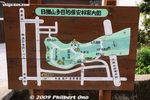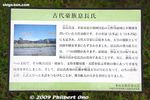Hinade Shrine Sumo Odori Dance and Sakata 日撫神社 奉納角力・角力おどり・坂田駅周辺
|
|
|

If you ride the Tokaido Line train between Maibara and Samegai Stations and look out the window in the north, you might notice this low hill called Hinade-yama.Near JR Sakata Station (Hokuriku Line) in former Omi-cho town is Mt. Hinodeyama with Hinode Jinja Shrine holding an annual sumo festival on the third Mon. of Sept. It features mainly children's sumo and a sumo jinku dance by about 16 men.
|
|

If you look carefully, you might notice a manmade structure on Mt. Hinade. Too small to be a castle, doesn't look like a house, looks like a lookout deck.
|
|

One day in 2009, I finally investigated this mountain in Maibara. It's about 2 km from JR Sakata Station on the Hokuriku Line toward Nagahama. You can rent a bicycle at Sakata Station.
|
|

Omi Branch of Maibara City Hall is near the foot of Hinade-yama.
|
|

Large torii in the middle of an intersection. It belongs to Hinade Shrine which is on Mt. Hinade.
|
|

The road around the mountain is decorated with lanterns on the occasion of Hinade Shrine's sumo festival on Sept. 21, 2009.
|
|

Entrance and torii to Hinade Shrine with banners announcing the sumo festival held on the third Mon. of September in Maibara.
|
|

Path to Hinade Jinja Shrine.
|
|
|
|

A few food and game stalls during the sumo festival.
|
|

Hinade Shrine is dedicated to a god called Sukunahikona-no-Mikoto and Okinaga-sukuneo. 少毘古名命(すくなひこなのみこと)・息長宿禰王(おきながすくねおう)MAP
|
|

Hinade Shrine in Maibara, Shiga Prefecture has Imperial connections as it also worships the legendary Emperor Ojin.
|
|

The shrine also has a sumo ring. In the 13th century, Emperor Go-Toba visited the shrine and watched sumo performed by the local people. He offered a yellow cow to the shrine. This was the start of the shrine's annual sumo festival.
|
|

Mt. Hinodeyama with Hinode Jinja Shrine holds an annual sumo festival on the third Mon. of Sept. It features mainly children's sumo and a sumo jinku dance by about 16 men. For the sumo festival, the sumo ring is decorated with four pillars and pieces of cloth. Near JR Sakata Station (Hokuriku Line) in former Omi-cho town.
|
|

The sumo festival started at 1 pm. They had kids and men on both sides of the sumo ring.
|
|
|

The yobidashi caller calls the name of the sumo wrestler.
|
|

The first match was between these two men who had a piece of paper in their mouths.
|
|
|
|

Winner. The sumo matches are held as religious ceremony dedicated to the shrine's gods.
|
|

Sanyaku Soroifumi has the top three ranking wrestlers (Ozeki, Sekiwake, Komusubi) stomp the ring to further purify the ring as they face the shrine.
|
|

Yobidashi
|
|

A few more matches by the men were held.
|
|
|
|
|
|
|

Ozeki
|
|

Then the children's sumo matches. Boys only, no girls. This was the main highlight and crowd pleaser.
|
|
|
|
|
|
|

The winners received various household and kitchen goods like towels, pillows, toaster, etc.
|
|
|

It wasn't so crowded. There were some photographers, and it received local TV news coverage.
|
|

The children's sumo were based on age. And they got older.
|
|
|
|

Prizes to be awarded.
|
|
|
|

A pillow for this winner.
|
|

Then they held the dohyo-iri ring-entering ceremony performed by the men.
|
|

While dressed in formal sumo aprons, they first went to the shrine to pray.
|
|
|

Hinade Shrine's priest blesses the wrestlers.
|
|

The wrestlers then walked to the sumo ring.
|
|
|

The men performing the ring-entering ceremony for the west side.
|
|
|
|
|

The same men perform the ring-entering ceremony for the east side. There were about 20 men.
|
|

After the ring-entering ceremony, the men remained on the ring and performed the sumo odori dance accompanied by sumo jinku singing.
|
|
|

Afterward, more children's sumo.
|
|
|
|

My YouTube video of the Hinade Shrine Sumo Odori Dance.Mt. Hinodeyama with Hinode Jinja Shrine holds an annual sumo festival on the third Mon. of Sept. It features mainly children's sumo and a sumo jinku dance by about 16 men. Near JR Sakata Station (Hokuriku Line).
|
|
|
|

Sumo tournament winners.
|
|

Then for fun, they held random sumo matches regardless of age and size.
|
|

Uneven match.
|
|
|
|

In the end, the boys take home their prizes in a large garbage bag.
|
|

More matches between the men.
|
|

Finally, the bow twirling ceremony (called Yumitori-shiki). Notice that he faces the shrine.
|
|

In the end, they gathered on the sumo ring and clapped their hands in appreciation.
|
|

Map of Mt. Hinade. There are short hiking trails on this low mountain.
|
|

Within the Hinade Shrine grounds is this entrance to a hiking trail going up Mt. Hinade-yama. Elevation is only 240 meters so it's an easy climb.
|
|

Hiking trail on Mt. Hinade.
|
|
|
|
|

Go left.
|
|

Easy hike and well worth it for the great views of Maibara. This is one of those places you've never heard of, but should visit.
|
|

While hiking up, you'll see a few views like this.
|
|

Rock
|
|

Pine tree
|
|

Looking toward Nagahama.
|
|

The lookout deck in view at the end of the trail.
|
|

Now this is what I saw from the train. It is a wooden lookout deck.
|
|
|

Lookout deck on Mt. Hinade.
|
|
|
|

Looking toward Maibara Station. You can see the tiny Heiwado sign with the white dove. That's next to Maibara Station.
|
|

Looking toward Sakata Station which is on the right of the white roof near the center of the picture.
|
|

Lake Biwa and Takeshima island off Hikone.
|
|
|
|

Shinkansen
|
|

Nagahama
|
|

Nagahama Dome and Chikubushima island in the background.
|
|

Nagahama
|
|

Shinkansen
|
|

Looking north
|
|

Meishin Expressway
|
|

Meishin Expressway
|
|

Summit of Hinade-yama is a rickety bench.
|
|

Another trail to go down. Mt. Ibuki in the distance.
|
|

Mt. Ibuki
|
|

Colorful moth
|
|

Also near Mt. Hinade are numerous ancient kofun (tumuli) burial mounds. They are related to the Okinaga Clan which is related to the ancient Imperial family.
|
|

The low hill on the left and right are tumuli.
|
|

The Maibara Omi Public Library also houses the Maibara Omi Haniwa Museum. 米原市近江はにわ館
|
|

For a rural museum, the Haniwa Museum is quite impressive. It displays ancient haniwa figures, made of clay, found in tumuli in the surrounding area.
|
|

A model of a burial mound. Go inside and it becomes a video projection room where you can see an entertaining video.
|
|

Haniwa figure
|
|

Haniwa figure shaped as a house.
|
|
|
|

JR Sakata Station platform on Hokuriku Line, between Maibara and Nagahama Stations. Very small station with no station personnel. Train tickets sold by one vending machine.
|
|

Sign promoting NHK Taiga Drama in 2006, "Komyo ga Tsuji."
|
|

Sakata Station platform
|
|

Sakata Station has a nice station building (next photo), but it is not connected to the train station. Totally separate.
|
|

Sakata Station building right next to the train platform. But you don't go through this building to get to the train platform. Very unusual. The building is almost deserted.
|
|

The station building does have an office and few tourist pamphlets. They also rent bicycles. 500 yen for a few hours. If you want to go to Mt. Hinade (about 2 km away), renting a bicycle is recommended.
|
|

In front of Sakata Station is a small plaza.
|
|

The plaza has this Statue of Lord Yamauchi Kazutoyo and Chiyo. 「なでしこ」山内一豊と千代
|
|

Statue of Lord Yamauchi Kazutoyo and Chiyo near Sakata Station in Maibara, Shiga. Unveiled on May 7, 2005. 「なでしこ」山内一豊と千代
|
|

The main characters featured in the NHK Taiga Drama in 2006, "Komyo ga Tsuji." Chiyo was Kazutoyo's wife and was born in this area. Chiyo became a nun after her husband died.
|
|

Sakata Station amid rice paddies.
|
|

A short walk from Sakata Station is the Gravesite of Lord Yamauchi Kazutoyo's mother, Hoshuin, in a very quiet place.
|
|

Gravesite of Lord Yamauchi Kazutoyo's mother Hoshuin. 法秀院の墓
|
|

Gravesite of Lord Yamauchi Kazutoyo's mother Hoshuin. 法秀院の墓
|
|

Plaque next to grave. Hoshuin never really left this place and died here as well.
|
|

Touristy touch
|
|
|

Now walking toward Naganoya.
|
|
|

Naganoya, Yamauchi Kazutoyo's childhood home. The front gate, made of wood, collapsed some years ago, and this wooden structure is all that's left. 長野家
|
|

Naganoya, the house where Yamauchi Kazutoyo lived during childhood with his mother.
|
|

Naganoya
|
|

Rice paddy
|
|
|
|